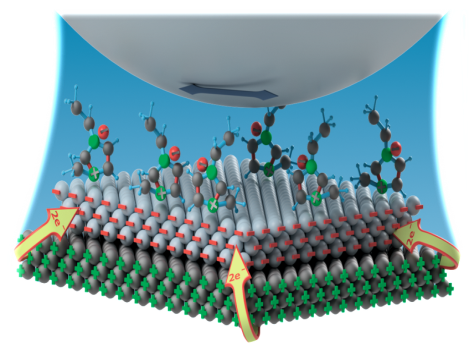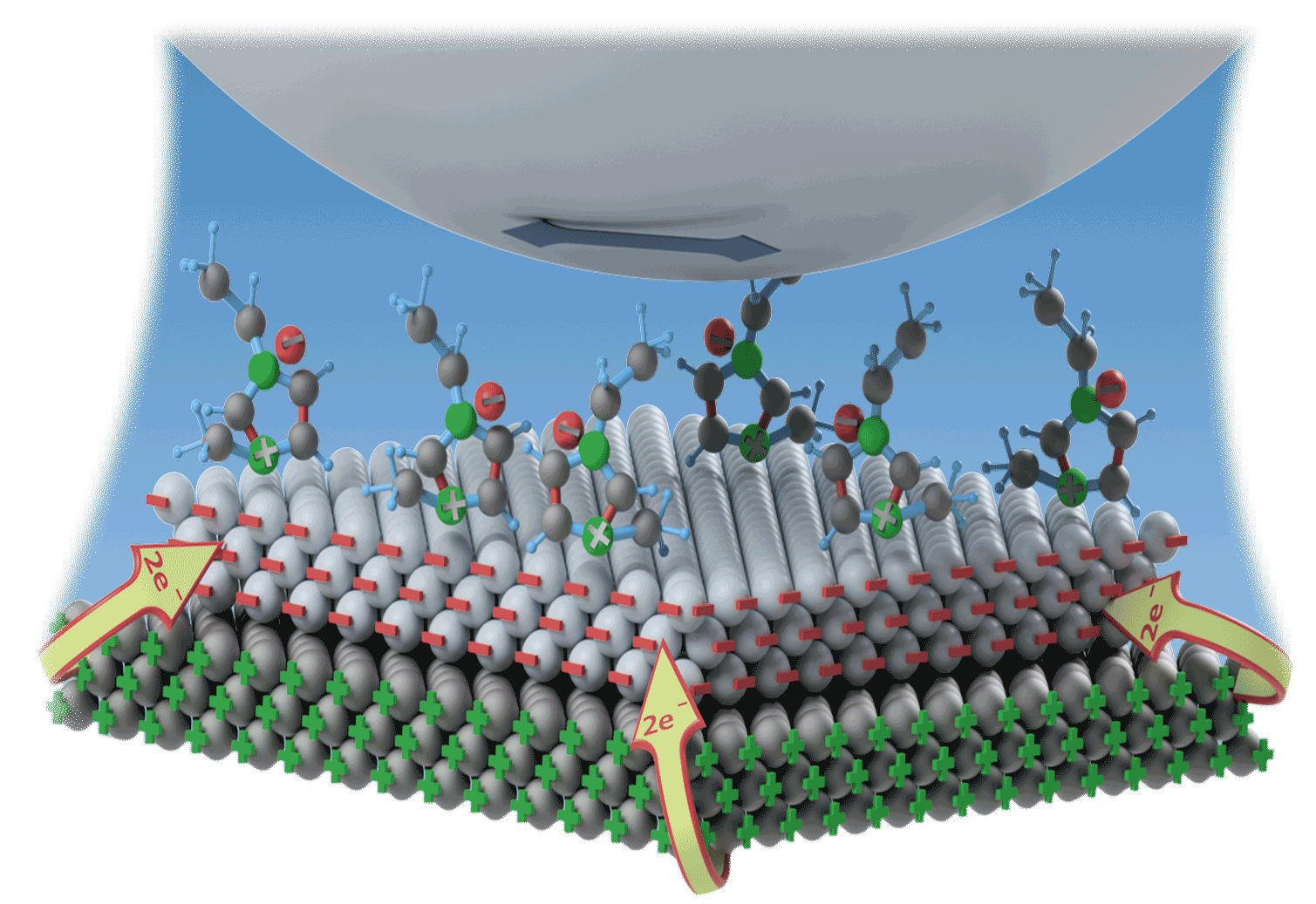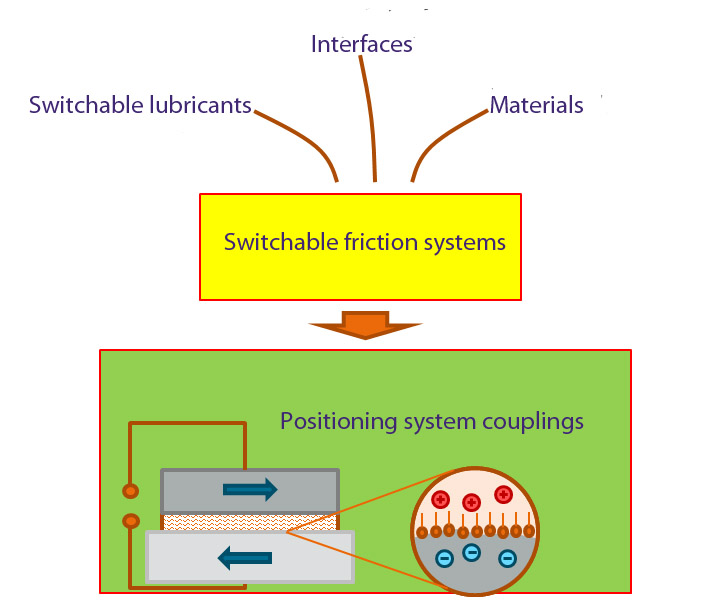Programmable friction
Motivation
Every mechanical motion causes friction. Globally, the effects are immense: more than 20% of energy consumption is caused by friction. Along with the material wear that occurs, friction is one of the determining factors for the efficiency, reliability and service life of components and systems.
The use of lubricants is correspondingly prevalent to reduce friction and wear. Whether in a wind turbine, vehicle transmission or in the manufacturing industry (machine tools, printing machines, pumps), every application needs an individually arranged lubrication system for low-friction and low-wear operation, wherein material and lubricant interact with each other.
However, friction conditions permanently vary. Frictional heat changes the temperatures and thus the frictional behavior. Also, the forces and speeds are usually dynamic, e.g. when starting a car. Increasing service time will lead to wear and aging of the lubricant. An intrinsically modifiable system based on programmable materials that dynamically optimizes frictional contact provides enormous technical potential mainly for plain or roller bearings and clutches.
What is being researched?
In the topic of “programmable friction’, the cluster investigates the possibilities of controlling friction by external triggers. Thus, for example, during the operation of a clutch, an optimum friction value for the current operating state can be set autonomously. In contrast to the unique adaptation of the lubricant to the friction system as it is currently state-of-the-art, this would be an enormous advantage. This could significantly increase the efficiency and service life of the application. The vision of the thematic focus is to program friction systems in such a way that they are always operated in the optimum tribological state over the entire application parameters. In principle, high (force transmission) or low (lubrication) coefficients of friction or a variation of both (positioning) can be desired.
Special attention is given to new solution approaches that make friction properties controllable by an optically or electrostatically induced change. These external switches specifically influence the interfacial chemistry and thus the accumulation of molecules or interactions between the two interfaces, thus enabling the control of friction properties (figure 1a, b).

An initial approach to electrically programmable friction is based on the use of lubricants containing ionic liquids (IL) as additives. These ILs are in the liquid state at room temperature and consist only of anions and cations. During corresponding electrical polarization of the friction surfaces, the anions or cations are attracted to or repelled from the surface in friction contacts and thus the friction is specifically altered.
For a clutch in which friction decreases due to ageing and wear, this would mean that a sensor would notice this and counteract it with an electric field, so that the transmittable torque increases due to increased friction again.
Another approach to a solution would be to control the friction via optically switchable lubricants or surfaces. In these systems, irradiation of light provides specific wave lengths which function as a switch. Two approaches are pursued here: On the one hand, the cluster is researching structural motifs that are applied to surfaces of the friction bodies and get reversibly interconnected via a light-induced reaction to increase the friction similar to that of a Velcro® fastener. On the other hand, the cluster is researching photo reactive lubricants. These contain reactive groups of molecules, which can also interconnect during light irradiation and thus increase the viscosity of the lubricant. Reversibility is ensured by releasing the molecular bonds by irradiating them with light of a different wavelength.
What are the challenges?
The biggest temporary challenge faced in electrically programmable friction is the search for the most effective ILs in combination with a base oil. Furthermore, the mixture of several ILs could improve the controllability of the friction value. The liquids are still relatively expensive. But this is not so problematic since the ILs should be used only in low concentrations as an additive in a base oil. However, this leads to the difficulty that a smaller number of ions are available that would have to attach to the surface in order to change friction. Since friction processes only take place directly on the surface and an extremely thin layer is sufficient, this should be possible with the right combination of base oil and IL.
At the fundamental level, the researchers will require better understanding of the surface mechanisms of the lubricant, of the corrosion behavior and of the exact influence of polarization on the lubricating effect. Up until now, friction has reduced at a greater rate in cases of higher potential, but at the same time, the ions could break down under high electrical voltage. The system integration will also be solved intelligently. For instance in automobiles, a clutch lubricated with programmable materials would have to be extensively electrically insulated.
In optically switchable systems, the main challenge is to achieve a strong friction effect that also adjusts sufficiently quickly. The system should not only be suitable for clutch systems but also for micropositioning systems that require fast switching times. In addition, approaches are being developed to switch viscosity by cross-linking the lubricant molecules. The mixture of switchable lubricants with conventional materials must also be ensured for setting the lubricant properties and limiting the material costs.
The system integration of optically switchable friction also needs to be cleverly solved. The aim here is to make components optically transparent and to keep the optically active layers thin so that the light switch can eventually be used effectively.
Status: 24.07.2019
Publications
Referred journals
Chalissery, Dilip; Schönfeld, Dennis; Walter, Mario; Shklyar, Inga; Andrä, Heiko; Schwörer, Christoph; Amann, Tobias; Weisheit, Linda; Pretsch, Thorsten; Highly shrinkable objects as obtained from 4D printing, Macromlecular Materials and Engineering 307/1 (2022) Art. 2100619, 12 pp.
Link
Participating institutes of the cluster: IAP, ITWM, IWM, IWU
Gatti, Felix Amann, Tobias; Kailer, Andreas; Baltes, Norman; Rühe, Jürgen, Gumbsch, Peter; Towards programmable friction: Control of lubrication with ionic liquid mixtures by automated electrical regulation, Scientific Reports 10/1 (2020) Art. 17634, 10 pp.
Link
Participating institutes of the cluster: IWM, ICT
Gäbert, Chris; Rosenstingl, Tobias; Linsler, Dominic; Dienwiebel, Martin; Reinicke, Stefan; Programming viscosity in silicone oils: Reversible tuning of rheological properties in 9-anthracene ester-terminated polydimethylsiloxanes, ACS Applied Polymer Materials 2/12 (2020) 5460-5468
Link
Participating institutes of the cluster: IWM, IAP
Non-referred journals
Gatti, Felix; Amann, Tobias; Kailer, Andreas; Abicht, Johannes; Rabenecker, Peter; Baltes, Norman; Rühe, Jürgen; Makroskopische Reibwertsteuerung durch elektrochemische Potentiale mit ionischen Flüssigkeiten, Tribologie und Schmierungstechnik 66/4-5 (2019) 51-57
Link
Participating institutes of the cluster: IWM, ICT, IWU
Conference proceedings
Beyer-Faiss, Susanne; Korth, Yasmin; Amann, Tobias; Schubert, Thomas; Plebst, Sebastian; Novel nanocomposite with ionic liquid and graphene for electroconductive radial plain bearings, in Proc. of 23rd International Colloquium Tribology: Industrial and Automotive Lubrication 2022 Vol. 23; Fatemi, A.; Pauschitz, A.; Topolovec-Miklozic, K. (Eds.); expert verlag, Deutschland (2022) 33-35
Participating institutes of the cluster: IWM
Linsler, Dominic; Gäbert, Chris; Reinicke, Stefan; Rangova, Theodora; Schlüter, Florian; Dienwiebel, Martin; Reversible viscosity tuning using UV light, in Proc. of 23rd International Colloquium Tribology: Industrial and Automotive Lubrication 2022 Vol. 23; Fatemi, A.; Pauschitz, A.; Topolovec-Miklozic, K. (Eds.); expert verlag, Deutschland (2022) 65-66
Participating institutes of the cluster: IWM
Beyer-Faiss, Susanne; Korth, Yasmin; Amann, Tobias; Schubert, Thomas, Plebst, Sebastian; Tribological behavior of electrically conductive lubricants and adapted nanocomposites in sliding bearings using ionic liquids and graphene, in Tagungsband Reibung, Schmierung und Verschleiß: Forschung und praktische Anwendungen, 62. Tribologie-Fachtagung 2021; Gesellschaft für Tribologie e.V, Aachen (2021) 32/1-32/11
Link
Participating institutes of the cluster: IWM
Gatti, Felix; Amann, Tobias; Kailer, Andreas; Baltes, Norman; Rabenecker, Peter; Marx, Benedikt; Rühe, Jürgen; Makroskopische Reibwertsteuerung mit elektrischen Potenzialen unter Verwendung ionischer Flüssigkeitsgemische, in Tagungsband Reibung, Schmierung und Verschleiß: Forschung und praktische Anwendungen, 62. Tribologie-Fachtagung 2021; Gesellschaft für Tribologie e.V., Aachen (2021) 30/1-30/4
Link
Participating institutes of the cluster: IWM, ICT, IWU
Linsler, Dominic; Gäbert, Chris; Rosenstingl, Tobias, Wirth, Lukas; Reinicke, Stefan; Dienwiebel, Martin; Böker, Alexander; Schaltbare Viskosität zur Kontrolle der Reibung, in Tagungsband Reibung, Schmierung und Verschleiß: Forschung und praktische Anwendungen, 62. Tribologie-Fachtagung 2021; Gesellschaft für Tribologie e.V., Aachen (2021) 29/1-29/2
Link
Participating institutes of the cluster: IWM, IAP
Gatti, Felix; Amann, Tobias; Kailer, Andreas; Abicht, Johannes; Rabenecker, Peter; Baltes, Norman; Rühe, Jürgen, Macroscopic friction value control by electrochemical potentials with ionic liquids, in Proc. of 22nd International Colloquium Tribology: Industrial and Automotive Lubrication 2020, Fatemi, A. (Ed.); Technische Akademie Esslingen, Ostfildern, Germany (2020 ) 301-302
Link
Participating institutes of the cluster: IWM, IWU, ICT
Kappe, Konstantin; Gustmann, Tobias; Gutmann, Florian; Stilz, Maximilian; Hoschke, Klaus, Metallic metamaterial with bistable behavior; in Proc. of 5th Fraunhofer Direct Digital Manufacturing Conference DDMC 2020; Müller, B. (Hrsg.) Fraunhofer-Verlag, Stuttgart (2020) 6 pp.
Participating institutes of the cluster: EMI, IWU
Gatti, Felix; Amann, Tobias; Kailer, Andreas; Rabenecker, Peter; Baltes, Norman; Rühe, Jürgen, Makroskopische Reibwertsteuerung durch elektrochemische Potentiale mit ionischen Flüssigkeiten, Reibung, in Tagungsband 59. Tribologie-Fachtagung 2018 - Schmierung und Verschleiß, Forschung und praktische Anwendungen Band 2/Schmierstoffe & Schmiertechnik; Gesellschaft für Tribologie e. V. GfT Aachen (2018) 68/1-68/4
Link
Participating institutes of the cluster: IWM, ICT, IWU
Lectures
Linsler, Dominic
Reversible viscosity tuning using UV light
TAE Esslingen
online, Deutschland; 24.01.2022-26.01.2022
Gatti, Felix
Lubrication control with electrical potentials using ionic liquid mixtures
62. Tribologie-Fachtagung 2021 - Reibung, Schmierung und Verschleiß.
Forschung und praktische Anwendungen
online, Deutschland; 27.09.2021-29.09.2021
Gatti, Felix
Lubrication control with electrical potentials using ionic liquid mixtures - considerations on different size scales to clarify the mechanisms
4th Young Tribology Congress 2021
online, Deutschland; 07.06.2021-08.06.2021
Lichti, Tobias
Surrogate modelling and optimization of unit-cell based programmable metamaterials
XXVII Conference on Computer Methods in Materials KomPlasTech 2021
virtuell, Polen; 08.03.2021-09.03.2021
Linsler, Dominic
Reversibly tunable viscosity of anthracene functionalized silicone oil
62. Tribologie-Fachtagung 2021 - Reibung, Schmierung und Verschleiß. Forschung und praktische Anwendungen
online, Deutschland; 27.09.2021-29.09.2021
Kailer, Andreas
Programmierbare Reibung
Fraunhofer-Symposium Netzwert 2019 »MOMENTUM«
München, Deutschland; 26.02.2019-27.02.2019
Amann, Tobias
Programmierbare Reibung
NORTEC 2020
Hamburg, Deutschland; 24.01.2020-24.01.2020
Gatti, Felix
Programmable friction (macroscopic friction value control by electrochemical potentials with ionic liquids)
22nd International Colloquium Tribology: Industrial and Automotive Lubrication 2020
Ostfildern, Germany, Deutschland; 28.01.1020-30.01.2020
Linsler, Dominic
Reversibly tunable viscosity of anthracene functionalized silicone oil
Materials Science and Engineering Congress MSE 2020
Digital Conference, Deutschland; 22.09.2020-25.09.2020
Linsler, Dominic
Reversibly tunable viscosity of anthracene functionalized silicone oil
GfT online, Deutschland; 28.09.2020-30.09.2020
Gatti, Felix
Makroskopische Reibwertsteuerung durch elektrochemische Potentiale mit ionischen Flüssigkeiten
59. Tribologie-Fachtagung der Gesellschaft für Tribologie e.V. GFT 2018 „Reibung, Schmierung und Verschleiß – Forschung und praktische Anwendung
Göttingen, Deutschland 24.09.2018-26.09.2018
Students' theses (Bachelor, Master, Diploma)
Ansätze zur Beeinflussung der Reibung von funktionalisierten Oberflächen mittels Licht (M)
Entwicklung eines elektrisch leitfähigen Schmierstoffes für Polymergleitlager (B)
Konstruktive Auslegung eines Kupplungsdemonstrators mit elektrisch schaltbarer Reibung (B)
Schaltbare Viskosität an funktionalisierten PAG (B)
Viskositätsschaltbare Silikonöle (B)
Viskositätsschaltbare Silikonöle (M)
Scientific prizes and awards
Nachwuchswissenschaftspreis für hervorragende wissenschaftliche Leistungen auf dem Gebiet der Werkstoffmechanik im Rahmen von akademischen Abschlussarbeiten und Dissertationen Fraunhofer IWM an PM2 für »Viskositätsschaltbare Silikonöle« 14.06.2021, Deutschland

